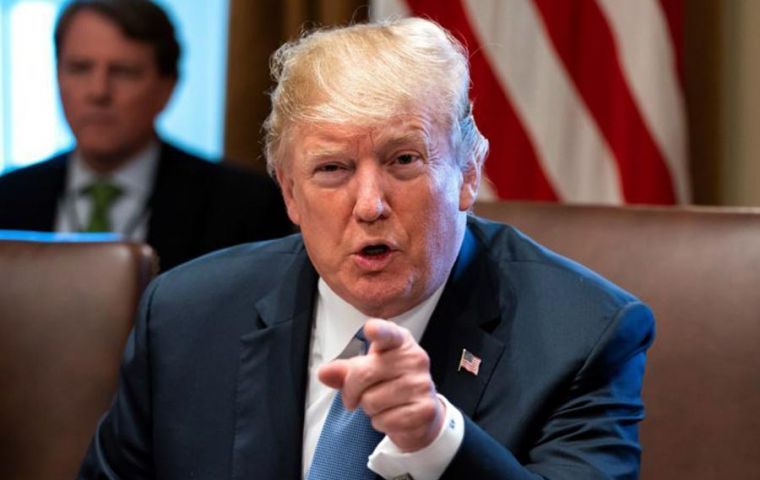MercoPress. South Atlantic News Agency
US identifies 17 Latin American countries as major drug transit and producing areas
 Trump wrote that the administration of president Andrés Manuel López Obrador needs to intensify efforts to eradicate opium poppies and interdict illicit drugs
Trump wrote that the administration of president Andrés Manuel López Obrador needs to intensify efforts to eradicate opium poppies and interdict illicit drugs President Donald Trump has warned he may take action against Mexico if it doesn't do more against drug trafficking. México is among the 22 major drug transit and drug-producing countries identified in a presidential memorandum released Thursday night by the White House.
Trump wrote in the document that the administration of Mexican President Andrés Manuel López Obrador needs to intensify efforts to eradicate opium poppies, interdict illicit drugs and prosecute and seize assets of traffickers.
If he fails to formally certify that Mexico is doing enough over the next 12 months, the U.S. could withhold financial assistance and block international development bank loans.
Trump made such a ruling in the cases of Bolivia and Venezuela, saying they failed to uphold their antidrug commitments over the past year.
The countries identified in the list are Afghanistan, The Bahamas, Belize, Bolivia, Burma, Colombia, Costa Rica, Dominican Republic, Ecuador, El Salvador, Guatemala, Haiti, Honduras, India, Jamaica, Laos, Mexico, Nicaragua, Pakistan, Panama, Peru and Venezuela.
“Without further progress over the coming year, I will consider determining that Mexico has failed demonstrably to uphold its international drug control commitments,” he wrote.
Mexico's Foreign Relations Department responded that the drug trade feeds on regional problems like demand, consumption, money laundering and weapons trafficking that can't be controlled by one country alone and require a regional approach.
“Drug trafficking and the violence associated with it are fed by high levels of consumption,” the department said in a statement that contained a veiled reference to the United States, the leading market for illicit drugs. “Drug use reduction goals are not always met by countries in the region.”
The department defended Mexico's efforts, saying the country “has made efforts to combat the production and trafficking of drugs in its territory, often with a very high cost in human and financial terms,” adding that U.S. pledges to help combat arms trafficking that feeds drug violence were appreciated.
Christopher Wilson, deputy director at Wilson Center's Mexico Institute, said the new warning is “something that has to be taken seriously, but still it is truly unlikely that it would actually occur.”
Wilson added the U.S. financial assistance does not amount to much given the size of the Mexican economy and is not as important as the bilateral cooperation on law enforcement issues.
“It is unclear if that is truly at risk, but that would be very negative to interest of both United States and Mexico,” he said.
Mexico had received almost no criticism from Trump after both governments agreed in June to rapid expansion of a new U.S. policy to make asylum seekers wait in Mexico while their cases wind through clogged U.S. courts.
That agreement came after Trump had threatened to impose tariffs, even though its neighbor had already negotiated an updated trade deal with the United States and Canada.
But Mexico has been in Trump's mind for a long time. During the electoral campaign, he insisted he would make Mexico pay for the construction of a border wall.
On the other hand, Trump complimented the efforts of the Colombian president Iván Duque in rolling back record-high coca cultivation and cocaine production and said “this progress needs to continue and expand.”
Trump reiterated his administration will work toward a joint goal to reduce coca cultivation and cocaine production by half by the end of 2023.
Trump had publicly chastised Duque over the drug issue in earlier years. But the White House reported in June that that coca cultivation and cocaine production in Colombia dropped slightly in 2018 for the first time in six years, though they remained at historically high levels.
Colombian Defense Minister Gillermo Botero wrote on Twitter the U.S. certification is “a big achievement and it encourages us to keep this commitment into the future.”




Top Comments
Disclaimer & comment rules-

-

Read all commentsREF: Afghanistan, The Bahamas, Belize, Bolivia, Burma, Colombia, Costa Rica, Dominican Republic, Ecuador, El Salvador, Guatemala, Haiti, Honduras, India, Jamaica, Laos, Mexico, Nicaragua, Pakistan, Panama, Peru and Venezuela
Aug 12th, 2019 - 10:47 am +1The Good News is that Brazil has stopped smuggling drugs illegally to the USA!
The Best News that now it is made easier to export the drugs 100% LEGALLY due to Diplomatic Immunity:
https://en.mercopress.com/2019/08/10/us-approved-the-nomination-of-bolsonaro-s-son-as-next-brazilian-ambassador-in-washington
Being Trump so low debased vile as he is, his “warnings” enhance the prestige of the countries mentioned.
Aug 12th, 2019 - 07:35 pm 0Commenting for this story is now closed.
If you have a Facebook account, become a fan and comment on our Facebook Page!